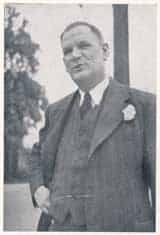Their Plans Were Spoiled
As biblical separation took place in the mid thirties over the apostasy in the Presbyterian Church in the U.S.A., more and more pastors and church members were struggling to hold on to their properties which they had built and paid for out of their own pockets. This battle was expected. They all knew that the Special Committee on Legal Procedure of the PCUSA had specifically stated that “the members of the individual Presbyterian Churches cannot by solemn resolution repudiate the authority of the PCUSA, then by subsequent resolution attempt to take their church property out of the denomination, even if their effort in so doing is unanimous.”
 One church would be an exception to that rule. The First Presbyterian Church in Leith, North Dakota, had voted unanimously on August 2, 1936 to renounce the oversight of the Presbyterian Church U.S.A. Their pastor, the Rev. Samuel Allen [1899-1954], had already done so, and was affiliated with the Presbyterian Church of America, which later on became the Orthodox Presbyterian Church.
One church would be an exception to that rule. The First Presbyterian Church in Leith, North Dakota, had voted unanimously on August 2, 1936 to renounce the oversight of the Presbyterian Church U.S.A. Their pastor, the Rev. Samuel Allen [1899-1954], had already done so, and was affiliated with the Presbyterian Church of America, which later on became the Orthodox Presbyterian Church.
Despite this oneness of heart, the Presbytery of Bismarck brought suit in civil court against the leaders and people of the Leith congregation. Their purpose was simple. It was to gain possession of all properties of the church. It took three years for the decision to come down from this court. But it did come down.
On June 17, 1939, the civil court awarded the property to . . . the congregation of the First Presbyterian Church! What made the difference between this case and all the other cases across the country? In one word, unanimity of the congregation was the difference. On that basis, the state court recognized that there was no schism on the vote. And so they awarded the property to the congregation.
While there is no Orthodox Presbyterian Church today in Leith, North Dakota, there is still one in Carson, the other preaching field of the Rev. Samuel Allen. God has been faithful to the Presbyterian people of faith in North Dakota.
Words to Live By:
In most cases in those years, the faithful people of God, along with their pastors, had to “let goods and kindred go” as they lost their church properties. While there were memories associated with those buildings, there were far greater memories associated with their allegiance to the Word of God. Let us follow their example always.
